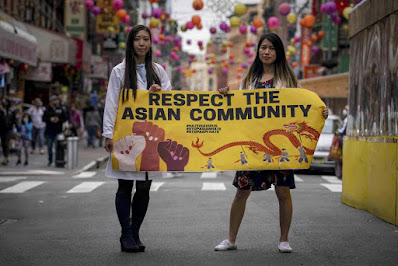Medical student Natty Jumreornvong ,protect Corona Virus but failed to protect her from "Anty -Bigotry of Asian-American Attack
NEW YORK - Medical student Natty Jumreornvong has a vaccine and protective gear to protect her from the corona virus.
But has failed to prevent exposure to anti-bigotry. Asians who showed up after the crisis. The pathogen was first identified in China.
Psychiatric patients have labled it a racial slur for the disease, she said. A passerby spat at the Thailand-born student for "going back to China" when she walked out of a hospital in New York City where she was.
When she went there in a robe on February 15, a man came up to her and growled "Virus Chinese" "took her cell phone and dragged her to a sidewalk," said Jumreornvong, who reported the attack to police.
The investigation is still ongoing. For Asian and Pacific Islander health workers, "It appears that we are fighting multiple struggles, not just against COVID-19 but against racism," said Jumreornvong, a student at Mount Sinai Icahn School of Medicine.
Asian Americans and Pacific islanders have faced a wave of harassment and attack in many situations during the pandemic, but health professionals feel a particular and worrying fear of being a racist target due to the virus as they work to prevent that people are dying from the virus.
"People in my community have gone from being a health care hero to being a scapegoat in a way," said Dr. Michelle Lee, a New York-based radiologist who brought together 100 robed medical professionals in March denounce Asian hate crimes.
"We're not bringing them the virus," said Lee, who remembers strangers on the street spat at him twice last year.
"We're literally trying to help you get rid of the virus. And the ancestors of the Pacific Islanders make up about 6% to 8% of the population of the United States,
but a higher proportion of some health professionals, including about 20% non-surgical doctors and pharmacists as well 12% to 15% of surgeons, physical therapists and medical assistants, according to federal agency data.Before the pandemic,
studies found that 31% to 50% of doctors of Asian descent were discriminated against in the work of patients refusing their care when they had difficulty finding mentors.
This is a lower percentage than black doctors, but higher than Hispanic and white doctors. This is the result of a 2020 study that reviewed existing research. In a separate 2020 study with medical professionals, all people of Asian descent stated that the patients were asked about their ethnicity origin.
University medical student Hueyjong "Huey" Shih recalls being confronted by a colleague in a hospital with "many assumptions, all summed up in one very inappropriate question": Was Shih because of the old one-child policy China's an only child? Born Shih, whose family is from Taiwan, said the colleague apologized after clarification.
As he wrote on the health news site Stat, he and medical students Jesper Ke and Kate E. Lee begged health institutions to include the experiences of Asian Americans and Pacific islanders. Asian Americans have been perceived as "eternal foreigners" for generations. in a country where they have been treated as a threat in the past.
Officials falsely accused San Francisco's Chinatown of an outbreak of smallpox in the 1870s, banned many Chinese immigrants under the Chinese Exclusion Law of 1882, and forced Japanese-Americans to internment camps even when dozens of thousands of their family members served in the U.S. Army during World War II.
During the pandemic, former President Donald Trump repeatedly called COVID-19 the "China Virus" and in other words what activists say fueled anger against Asian Americans.Police reports of hate crimes against Asians in 26 major cities and counties rose 146% last year, while hate crimes rose 2% overall in San Bernardino,
according to the California State University Center for Investigating Hate and Extremism in San Bernardino.
The Stop AAPI Hate group received nearly 3,800 reports of assault, harassment and discrimination from mid-March 2020 to the end of February before a gunman killed eight people, including six of Asian descent, at massage companies in the area in Atlanta in March.
The escalation "makes racism appear much more frightening than the virus" to Dr. Amy Zhang, an anesthesiologist at the University of Washington Hospitals.
"It's a constant fear. You never know when you will be a target," he says. At the start of the pandemic, he faced the risk of COVID-19 while intubating patients.
And face to face with racism, when a white man mumbled vulgarly about China in the street and "gave us smallpox," he followed her while shouting racist epithets and sexual threats until she entered the hospital, he said.

Post a Comment
Don't allow spam link